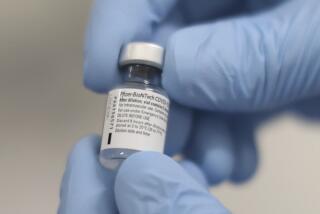Tests on Bladder Infection Vaccine May Begin in ’98
WASHINGTON — Human tests may begin next year on a vaccine to protect against painful bladder infections that annually affect more than 7 million Americans--most of them women--and cost more than $1 billion to treat.
In studies on laboratory mice, the vaccine disarmed nearly all strains of E. coli, the bacterium that causes more than 90% of all urinary tract infections.
Researcher Solomon Langermann said Thursday that the vaccine is being tested in monkeys and should be ready for human trials in 1998, if the federal government approves.
Bladder infections are one of the most common of all infections, affecting 7 million to 8 million Americans. E. coli is a common bacterium in the colon, where it has a beneficial effect.
The infection usually occurs when E. coli is transferred from the rectum to the urinary tract and then up that tract to the bladder. About 95% of all such infections occur in women.
Bladder infections usually are treated successfully with antibiotics, but some E. coli are becoming increasingly resistant. In uncommon cases, usually in patients who already are seriously ill, bladder infections can spread to the kidneys and can be a contributing factor in deaths, experts say.
Langermann said the vaccine creates antibodies against a protein that E. coli uses to establish infection in the bladder.
Langermann, of MedImmune Inc. of Gaithersburg, Md., was lead author of a study to be published today in Science.
Dr. Jerry Blaivas, a professor of urology at Cornell University’s New York Hospital, said a vaccine against E. coli urinary tract infections “would have an enormous impact” on general public health.
“It is the second-most-common cause of morbidity [illness] in the country,” Blaivas said.






